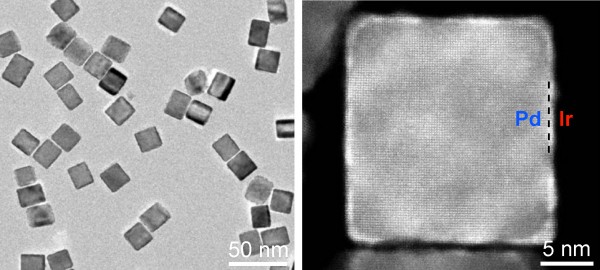New Catalyst Yields More Accurate PSA Test

Xiaohu Xia A research team led by Michigan Tech chemist Xiaohu Xia developed a catalyst that improves the sensitivity of the standard PSA test over 100-fold. The catalyst, pictured above, is made of palladium nanocubes coated with iridium.
Say you’ve been diagnosed with prostate cancer, the second-leading cause of cancer death in men. You opt for surgery to remove your prostate. Three months later, a prostate surface antigen (PSA) test shows no prostate cells in your body. Everyone rejoices.
Until 18 months later, when another PSA test reveals that now prostate cells have reappeared. What happened?
The first PSA test yielded what’s known as a false negative result. It did not detect the handful of cells that remained after surgery and later multiplied. Now a chemist at Michigan Technological University has made a discovery that could, among other things, slash the numbers of false negatives in PSA tests.
Xiaohu Xia and his team, including researchers from Louisiana State University and the University of Texas–Dallas, have developed a new catalyst that could make lab tests like the PSA much more sensitive. And it may even speed up reactions that neutralize toxic industrial chemicals before they enter lakes and streams.
Their new catalyst mimics the action of similar biochemicals found in nature, called peroxidases. “In animals and plants, these peroxidases are important— for example, they get rid of hydrogen peroxide, which is harmful to the organism,” said Xia. In medicine, peroxidases have become powerful tools for accelerating chemical reactions in diagnostic tests; a peroxidase found in the horseradish root is commonly used in the standard PSA test.
However, these natural peroxidases have drawbacks. They can be difficult to extract and purify. “And, they are made of protein, which isn’t very stable,” Xia explained. “At high temperatures, they cook, like meat.”
“Moreover, their efficiency is just fair,” he added. “We wanted to develop a mimic peroxidase that was substantially more efficient than the natural peroxidase, which would lead to a more-sensitive PSA test.”
Contact Information
Xiaohu Xia, assistant professor of chemistry
Michigan Technological University
xiaxh@mtu.edu
(906) 487-2048
Media Contact
More Information:
http://www.mtu.eduAll latest news from the category: Health and Medicine
This subject area encompasses research and studies in the field of human medicine.
Among the wide-ranging list of topics covered here are anesthesiology, anatomy, surgery, human genetics, hygiene and environmental medicine, internal medicine, neurology, pharmacology, physiology, urology and dental medicine.
Newest articles

Red light therapy for repairing spinal cord injury passes milestone
Patients with spinal cord injury (SCI) could benefit from a future treatment to repair nerve connections using red and near-infrared light. The method, invented by scientists at the University of…

Insect research is revolutionized by technology
New technologies can revolutionise insect research and environmental monitoring. By using DNA, images, sounds and flight patterns analysed by AI, it’s possible to gain new insights into the world of…

X-ray satellite XMM-newton sees ‘space clover’ in a new light
Astronomers have discovered enormous circular radio features of unknown origin around some galaxies. Now, new observations of one dubbed the Cloverleaf suggest it was created by clashing groups of galaxies….





















